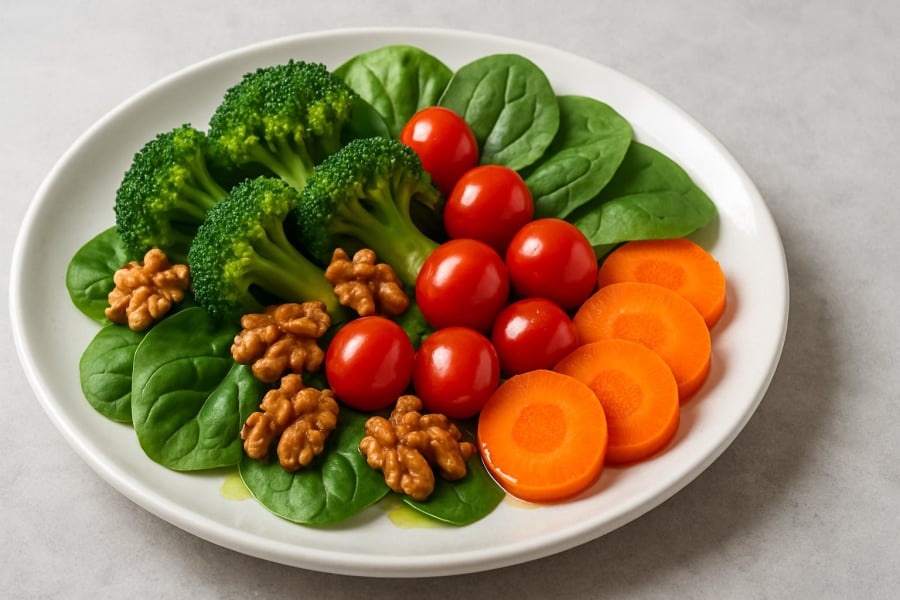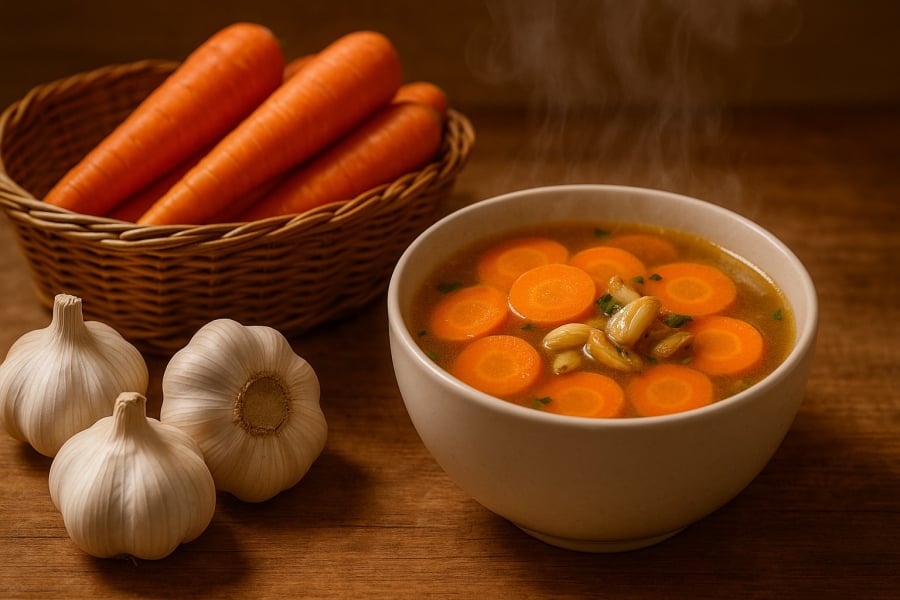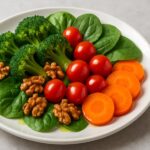## Cancer Prevention Starts with Your Daily Diet
The Key to Cancer Prevention Lies in Your Daily Diet
Have you ever wondered if what we eat daily can help protect our bodies from dreadful diseases like cancer? According to the World Health Organization (WHO), about 30-50% of cancer cases can be prevented through a healthy lifestyle, with diet playing a crucial role. Notably, green vegetables, a familiar “companion” on our dining tables, are a valuable source of nutrients that boost our immunity and prevent the formation of cancer cells.
Today, let’s explore six types of vegetables that are not only delicious but also act as a “green shield” to safeguard your and your family’s health.
Broccoli – The Effective “Green Warrior” Against Cancer
Broccoli is a common vegetable easily found in markets and supermarkets. With its refreshing green color and delicate flavor, it not only enhances the appearance of dishes but also offers numerous health benefits.
Broccoli is rich in vitamins C, K, and A, fiber, and especially sulforaphane, a potent antioxidant. According to research by Harvard University (USA), sulforaphane can inhibit the development of cancer cells, particularly in breast and prostate cancer.
Sulforaphane works by stimulating the body to produce detoxifying enzymes, eliminating harmful free radicals. Simultaneously, it reduces inflammation, a significant risk factor for cancer.
Preparation tips:
- Boil or steam lightly to retain nutrients.
- Stir-fry with garlic to enhance flavor and health benefits.
- Add to salads or soups.
Note: Avoid overcooking as high temperatures can destroy valuable compounds in broccoli.
Tomatoes – The “Red Weapon” Against Cancer
Tomatoes are familiar in Vietnamese cuisine and are widely used in soups, stir-fries, and sauces.
The standout component in tomatoes is lycopene, a powerful antioxidant that protects cells from DNA damage. A 2022 study published in the American Journal of Clinical Nutrition revealed that individuals who consumed more tomatoes had a 20% lower risk of prostate cancer.
Lycopene works by neutralizing free radicals and preventing inflammation, thereby reducing the risk of tumor formation.
Preparation tips:
- Make fresh tomato juice.
- Cook in sour soups or stir-fry with beef.
- Roast tomatoes to enhance lycopene absorption.
Note: Cooking tomatoes makes it easier for the body to absorb lycopene.

Garlic – The Golden Spice for Health
Garlic is an indispensable spice in Vietnamese cuisine and a “superfood” for health.
Garlic contains allicin, a compound with strong anti-inflammatory and antioxidant properties. According to research by the National Cancer Institute in the USA, garlic can reduce the risk of stomach and colorectal cancer.
Allicin boosts the immune system and prevents the growth of cancer cells by stimulating cell death (apoptosis).
Preparation tips:
- Consume raw to maximize nutrient intake.
- Sauté in olive oil to add flavor to dishes.
- Add to stews or soups.
Note: Avoid excessive consumption of raw garlic as it may irritate the stomach.
Spinach – The Nutrient-Rich “Superfood”
Spinach is a dark green leafy vegetable with a mild flavor that easily blends into various dishes. It is highly regarded by nutrition experts for its dense nutrient content.
Spinach is packed with vitamins A, C, and K, folate, iron, and especially lutein, a powerful antioxidant. According to a 2021 study in the European Journal of Clinical Nutrition, spinach can reduce the risk of breast cancer in women by inhibiting the growth of malignant cells.
Lutein and flavonoids in spinach protect cells from free radical damage. Additionally, folate in spinach supports DNA repair, reducing the risk of genetic mutations, a leading cause of cancer.
Preparation tips:
- Blend with bananas or apples to make a smoothie.
- Make a salad with olive oil and walnuts.
- Lightly boil or steam to retain nutrients.
Note: Avoid overcooking spinach as high temperatures can destroy some essential nutrients.
Carrots – The “Orange Weapon” Against Cancer
Carrots are familiar root vegetables with an eye-catching orange color, widely used in Vietnamese cuisine.
The standout component in carrots is beta-carotene, a precursor of vitamin A and a potent antioxidant. A 2020 study published in the International Journal of Cancer revealed that regular carrot consumption could reduce the risk of lung and stomach cancer.
Beta-carotene works by neutralizing free radicals and boosting the immune system. Simultaneously, it helps prevent the formation of new blood vessels that feed tumors, a critical step in cancer development.
Preparation tips:
- Grate into salads or make juice.
- Simmer in bone broth or soups.
- Stir-fry with onions and garlic to enhance flavor.
Note: Avoid excessive carrot consumption as it may cause temporary carotenemia, resulting in yellow skin.

Other Cruciferous Vegetables – The “Green Family” for Health
Cruciferous vegetables like cabbage, kale, Brussels sprouts, and bok choy are nutrient-rich and common in daily meals.
These vegetables contain glucosinolates, natural compounds that convert into isothiocyanates and indoles during digestion. According to research by the National Cancer Institute in the USA, these compounds can inhibit cancer cell growth, particularly in colorectal, breast, and thyroid cancer.
Glucosinolates and their breakdown products stimulate cell death (apoptosis) in malignant cells, reduce inflammation, and prevent tumor blood vessel formation.
Preparation tips:
- Cabbage can be boiled, steamed, or made into kimchi.
- Kale can be used in salads or dried as a healthy snack.
- Roast Brussels sprouts with olive oil and spices for a tasty treat.
Wash and soak in salted water to remove pesticide residues. Avoid overcooking to retain valuable compounds.
Conclusion: Wise Choices for Long-term Health
The vegetables mentioned in this article are not just familiar ingredients in our daily meals but also silent protectors, helping our bodies fight against cancer. Each vegetable boasts a unique set of valuable nutrients, contributing to a robust shield against disease-causing factors.
Remember, a healthy diet is just one aspect of cancer prevention. A positive lifestyle, regular exercise, and periodic health check-ups are equally essential. Are you ready to start taking care of your and your family’s health?
If you found this article helpful, don’t hesitate to share it to spread this important message to more people!
“The Surprising Reason Why Wet Nurses Were Used in Feudal Times”
“Few are aware that the Ming Dynasty established an intriguing institution named the ‘House of Wet Nurses’, dedicated to selecting married women aged 15 to 20 to nurture the imperial princes. This unique institution sheds light on a fascinating aspect of imperial China’s history, offering a glimpse into the meticulous care and attention bestowed upon the royal offspring.”





































